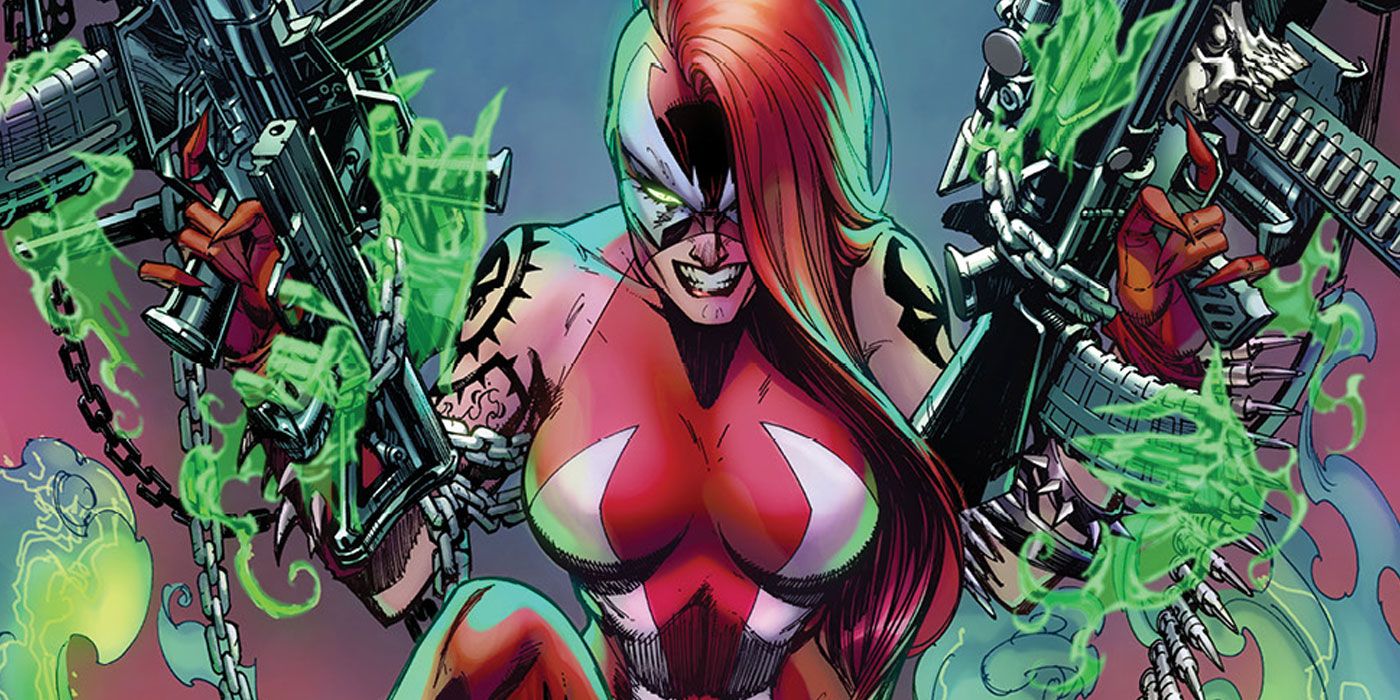
Next year marks the 30th anniversary of Spawn, and the flagship Image Comics title is poised to expand into a full-on interconnected universe. In June, Spawn's Universe will launch a line of new titles headlined by different characters spinning out of the special. Now, after Image Comics co-founder Todd McFarlane has helmed the title over the last 30 years, he is encouraging others to follow his creator-owned footsteps.
In an exclusive interview with CBR, McFarlane reflected on Spawn's forays into other forms of media. He also provided an update on the eagerly anticipated cinematic reboot, explored the legacy of opportunity that Image continues to provide to his fellow comic book creators and more.
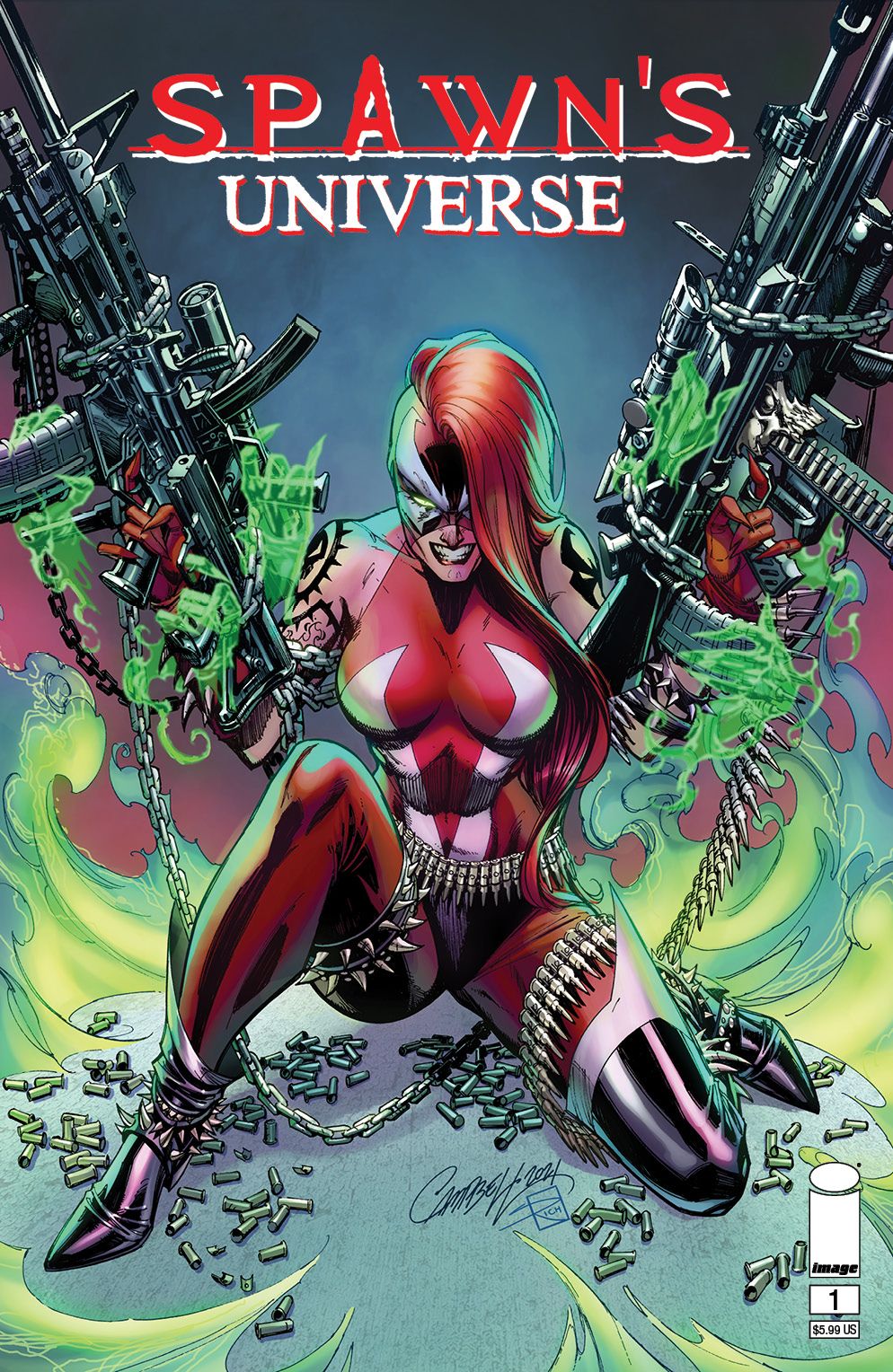
CBR: On a personal note, my gateway into Spawn was watching the HBO animated series, probably way too young, and I remember watching you in all those episode intros. Did you write those yourself?
McFarlane: No, I had input into all of them with the writers, but we just sat down and said, "Hey, what do we want to do? What would be interesting for this opening?" To digress with an interesting bit of trivia, the first season where I was at the desk, those were directed by one of HBO's former roommate-buddy-whatever, who was doing a little bit of directing at the time: a guy by the name of Doug Liman. He has since then gone on to be a big, giant director -- the guy that came to the house one day and looked like some college kid that hadn't eaten for a week and his hair was all frizzy; an art guy. It's fun to track some of the people you run into over the decades.
In talking about that singular vision, you had taken on the task of writing and directing a Spawn reboot. I was wondering if you could offer any update with that project.
McFarlane: The update on that was that the script that I wrote -- I liked it, but I'm biased -- didn't quite garner the enthusiasm that I was hoping for, because the reaction from most people was, "Why isn't there more Spawn?" I turned in this horror movie where the boogeyman only comes a couple times. They couldn't quite get their heads wrapped around it and I kept saying, "Jaws isn't every scene either and I think he's the star of the show!"
Anyways, we sort of agreed to let some veteran hand sort of have their go at it. We've got a couple huge, big-name writers who are in the middle of the process now and I think when those names go public, it's going to blow people away. We actually just got an update yesterday, so all of that is still moving forward. Once that script gets to the place we're at, I'm guessing with the pedigree of everybody I've already got, plus the names of the writers, it will be a fairly easy sell with that story; it's still moving and grinding.
That's why I do my comic book, so I have something to do in between some of this movement that seems like it goes through at a glacier's pace. Hollywood, I don't understand it sometimes, that's why I got a day job. In the meantime, I'll put out these comic books: Spawn's Universe is tracking to be Image's biggest new launch in the last 25 years, for sure, in the 21st century. I'll just go, "While you guys keep going, I'll keeping building momentum on the Spawn brand," because if [what] I'm doing with the universe works, the only thing that could pop it even bigger, harder and faster could be if some big news happens or if Spawn is on TV or in the theater.
Whenever The Walking Dead, Invincible or The Old Guard comes out -- boom -- all those trade paperbacks and the monthly sales all jump because people go, "What is this?! I didn't know there was a comic book?!" If I can set a strong floor to the success of the universe and midway, maybe this year, we get a big news drop on the movie -- boom -- that will be a catalyst to put it over the finish line and show that this is worthy and worth taking a curious look at.
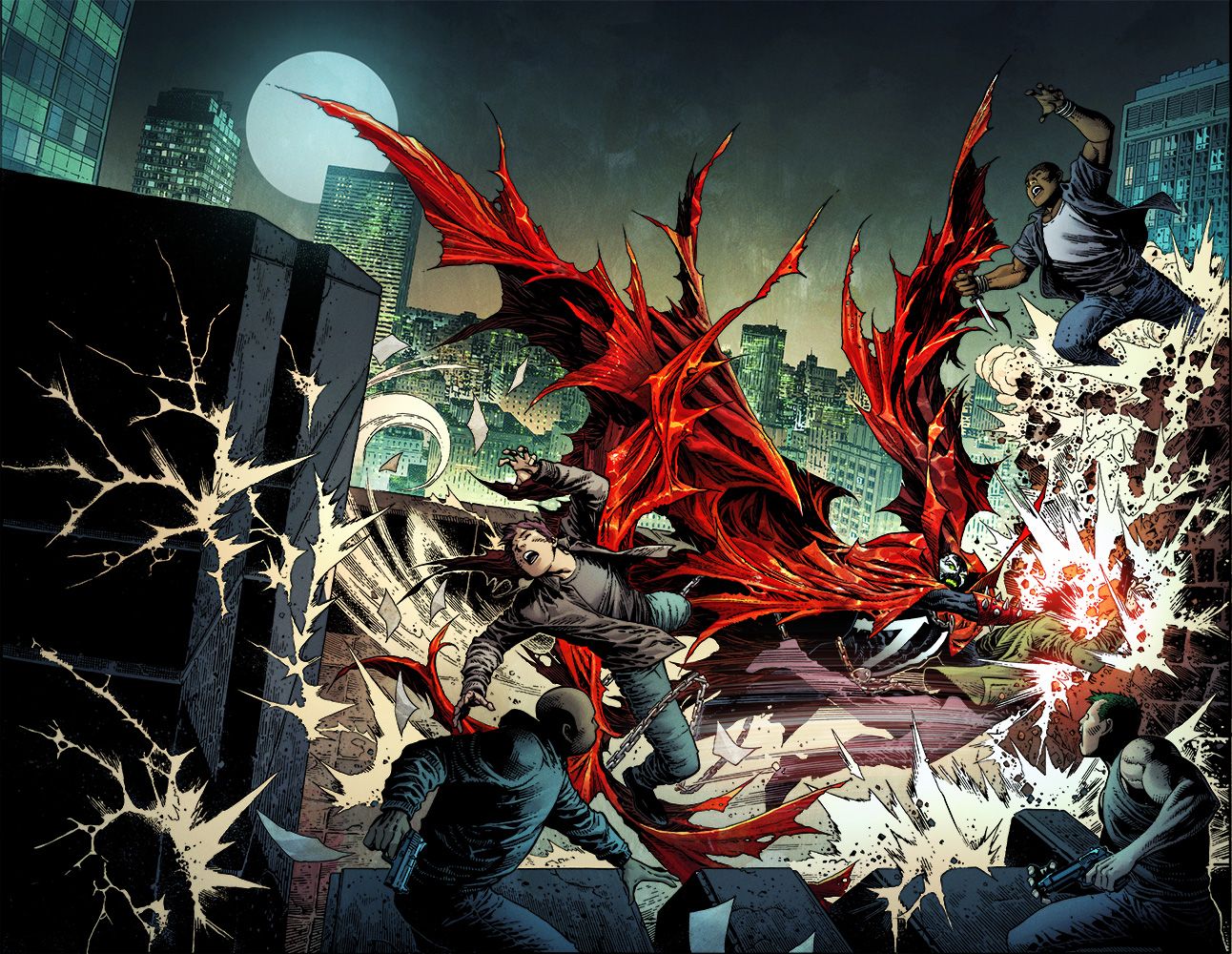
You have crossed paths before at comic conventions and whenever you do a signing, those Spawn trades and merchandise sells like hotcakes. What do you think it is about Spawn that commands such a loyal fanbase for nearly three decades?
McFarlane: I would say the biggest piece of that puzzle is the longevity because if all of us were to [go to] people next door who might not be into comic books, "Name twenty superheroes," invariably, the ones they'll name will be the ones who have been around the longest: Superman, Batman, Wonder Woman -- especially now that they've gotten movies that they're entrenched in. But even before they got those movies, they're still going to go to the ones that've been around for decades. The value of longevity is that, although there may be moments along the way that may have been high points and low points, what is way more valuable is that the whole is always better than the parts.
People will say they like Spider-Man, but not that issues #164-174 weren't very good. They're not going to say that. They either like that character or they don't. You pick and choose the ones you like better and it's the same with creative people: Somebody can say, "I like Greg Capullo, he's my favorite," and it may not be because one particular issue, page or character but because he's been around for 25 years and the entire body of his work rarely lets you down, if ever. That's why you like Greg Capullo; he's just amazing and whatever he draws, you're going to go for it.
Don't underestimate repetitiveness or attrition. It just seeps into you. I have never, ever searched out or intentionally read anything about a Kardashian, yet I know they exist and I actually know some of their names. How is that possible? I don't care but they've permeated through headlines here and there. There's a value in being around, just sort of bleeding outward. Spawn has had that, and there's been some quality that goes along with it. There's been toys and video games and the movie along the way to help put it in the psyche. Issue #300 had a bit of a moment where we set a record and caught people's attention again and now Spawn is going to expand into a universe.
All of it is the reason we're still here and still rumbling, it isn't because of A, B and C, it's because I kept going for thirty years. I assume that anybody that does any book for thirty years has some success because if they haven't, they would've been cancelled way before that.
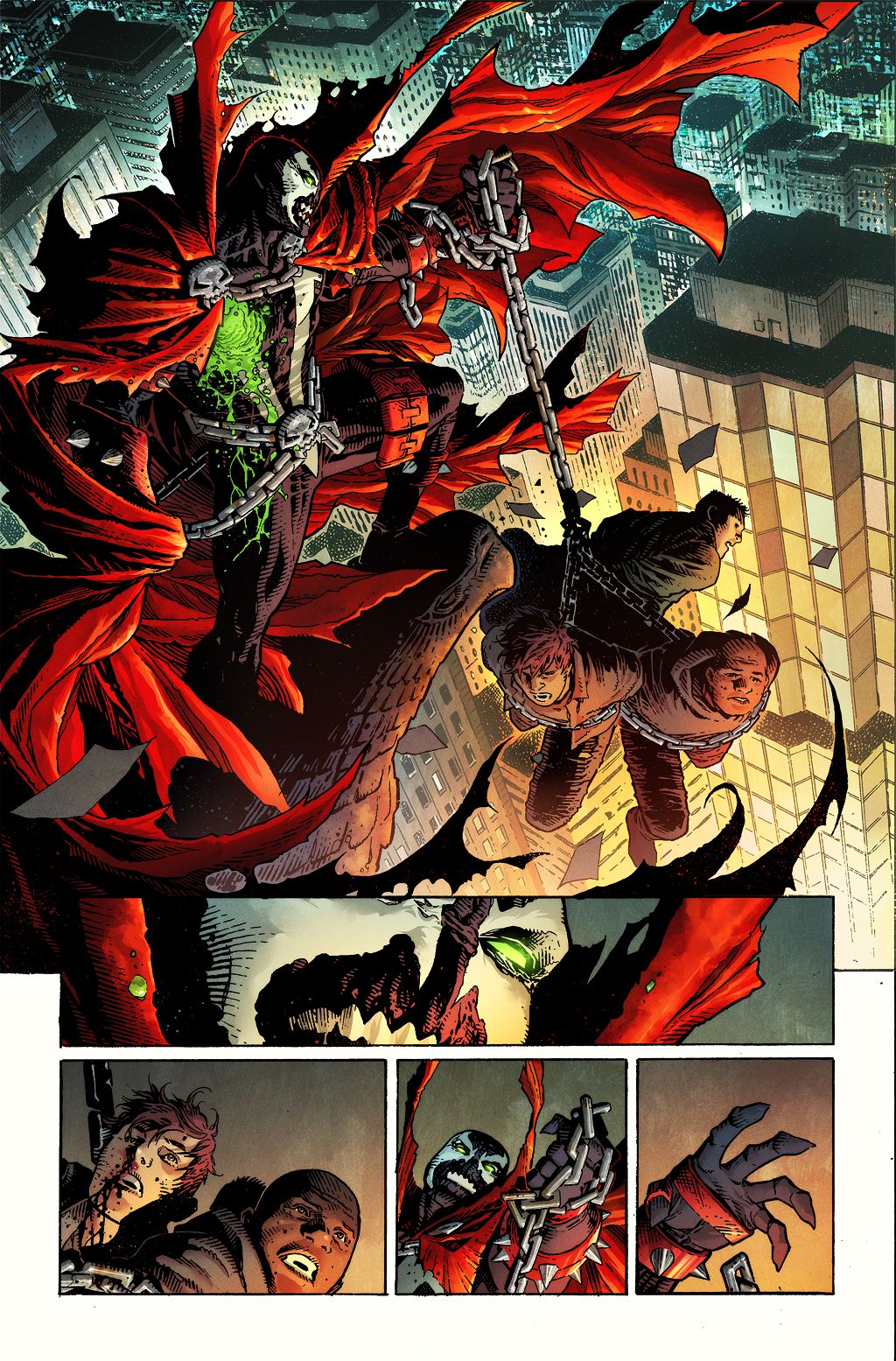
You guys are about to launch the comic book titles King Spawn, Gunslinger Spawn and The Scorched this year. What can you tease about Spawn's 30th anniversary next year?
McFarlane: We just started having that conversation because I was so focused on getting Spawn's Universe along I hadn't even been thinking about that, but [Image Comics Publisher and Chief Creative Officer] Eric Stephenson mentioned it. I don't really think about it as the 30th anniversary of Spawn; I think about it as the 30th anniversary of Image, because those two things happened in the same year. I have such great pride of being part of and President of Image Comics, sometimes I forget I also do that book called Spawn because I think Image and Image's existence through three decades is a bigger story than Spawn. Spawn is a byproduct of the opportunities that Image has presented; The Walking Dead is a byproduct of what Image has done. If you were to ask Robert [Kirkman] or anybody else that has some success, they would say, "I got the opportunity at Image."
For me, Spawn is still kind of #2: There's Image and then, oh yeah, Spawn came from Image. I'm proud, just like I'm sure Erik Larsen is, that the books and characters we started all the way back in 1992 are still around and still relevant in the comic book world. That's not an insignificant feat to stick with something for decades. Here's what's interesting, Sam: When you're doing interviews and people are asking these questions, a lot of the questions at times can be introspective and I don't think people, for the most part, analyze themselves. If I was to say, "Sam, what drives you?" and you might give me your answer, but you don't really think about it. You're just Sam everyday, you're just doing what's natural to Sam, and people want an answer to why it's so natural for you.
I think most people that are in the spotlight of any level of celebrity, for the most part, don't analyze why they do it. They just do it because they enjoy it; they get a kick out of it. If the money was half as much, they'd probably still be doing it anyways. It's not a money thing. Obviously, when you get some success, you want to retain it and avoid being one-hit wonders. We're having success with Spawn and things are working, but the thing people don't realize is even if that wasn't true, I'd still be doing this. I'd still be doing the exact same thing. If I post something on my social media and say, "I'm going to do this tomorrow," and everybody on my social media says they hate that, I'm still going to do it tomorrow. And if everybody says they love it, I'm still going to do it tomorrow. My actions are not predicated now on what other people want out of me.
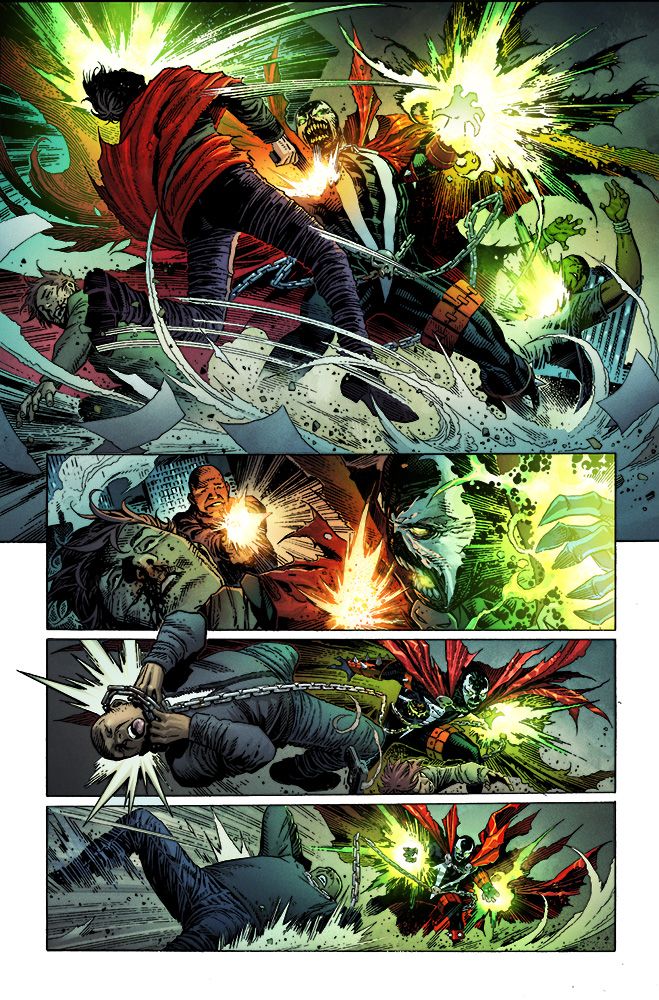
I do what I do what I do and I've done it for a long time. Here's what I do and enjoy as the only person I control on the planet. I'm going to present it to the world and I'm looking for enough support, hopefully, so that I can continue to do it. If you want to get intellectual about it, if I put all the people collecting Spawn to one side and all the people not collecting Spawn to the other and round it down to the nearest decimal, it's 0% of the population collecting Spawn. [laughs] I guess I could get mad that eight billion people aren't or I could be thankful, which I am, that I found enough to at least let me break even so I can get up and do it again next month and the months turn into years and the years turn into decades. And all that goes along with that -- fame, fortune or whatever -- those are byproducts of doing your job in a way that a lot of people like but it's not a goal.
I got this idea, I'm going to do a book and make it super cool and that's it. That should be the start of it. And if that blows up, then that ends up being The Walking Dead; I'm sure that's how Robert started, with this cool zombie idea. He had no idea where it would lead him to. Those are the afterthoughts of doing it. People engineer it backwards sometimes, going, "I wish I could make a lot of money!" Some people want to become a doctor or lawyer not because they give a shit about becoming a doctor or lawyer, they just want to get paid a lot. I meet those people and can tell who they are, the doctors that want to drive a Mercedes-Benz instead of healing people or lawyers more interested in Armani suits and cocktail parties that being embedded in the legal system. I've always said go the other way. Do what you have a passion for and you may be surprised what the byproduct of that is: success and all that comes with it.
You've been working on Spawn a long time. What do you think the benefit of hindsight and surprises along the way have informed you along the way?
McFarlane: It's the same thing we learn through life. You learn where the pitfalls are. Here's what old people have over young people: We've made more mistakes. That's it. I guarantee that's a truism. We've made more mistakes because we've lived longer than you and our goal, especially as parents, is to try to steer you away from those potholes. I tripped in those potholes 10-30 times in our life and we want to know where the potholes are and would like to prevent you from stepping into all of them.
That's what we do as parents: My kid comes up to me and asks for help to become President of the United States and I've never been the President of United States. I don't know how it works but, Son or Daughter who wants to President, I can tell you how not to be President of the United States. I can tell you where the dead end streets are, but how to become the President? That's on you. Turn around and walk away from that hole and go in a different direction and hopefully you find it; we don't all find it but we can prevent [hitting potholes].
What is hindsight as I'm talking to creative people? I've gotten the feeling what the fans respond to and what they don't, what retailers like, with the prices, the characters, what kind of quality. And, at best, it's still an educated guess and you hope you make more right educated guesses than wrong ones and then you call it a life and that's it. And then you mix in personality and start to figure out what kind of personalities you're dealing with and what you can evoke from those: Some people are polite and shy, which is way the opposite of me. Why am I the way that I am? Because I came out of the womb that way. There isn't one day of my life where I haven't been this way. Why do you some dogs bark and some bite? You can get a nice, polite golden retriever who's the best dog in the world, you can't teach him to bite because he doesn't have the personality for it. Humans are the same way. The majority of us are nice people who don't want risk in our lives, so they're not going to be entrepreneurs. We want the steady paycheck and don't like the unknown. Being an entrepreneur, that's an unknown, people don't like that; maybe they have friends and family they're counting on.
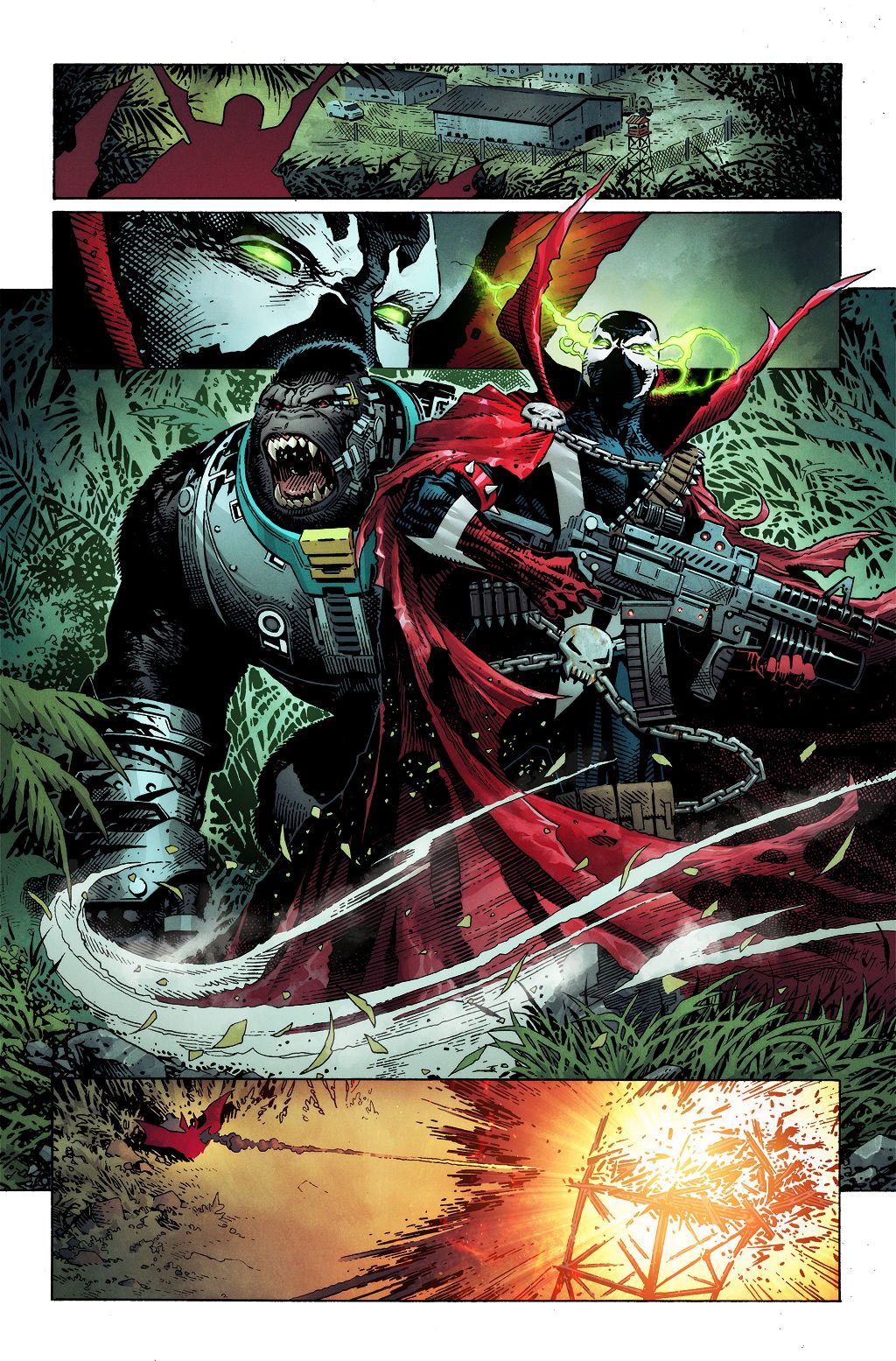
You have to navigate all of that and try to get something of value back out of it. Am I going to have some people do a hundred pages for me? Of course! Am I going to get some who will only do two covers? Yep! And are both of those okay for me? Yeah, because it's the right decision for that individual and I assume an individual should be at the forefront doing all of it. Do I think every creator should do a creator-owned book? Yeah! But do I know for a fact every creator won't do a creator-owned book? Of course, because then Marvel and DC would never have any artists and writers.
People don't mind being freelancers maybe for their whole life or a portion of their life, so I'm going to go the people that don't want to exclusively do their own stuff and say, "You do this and not only will I reward you with a better pay rate than you would've got with those guys, but if any of this turns into anything meaningful, then I'll make sure you have a way bigger ownership [than] if you were at Marvel or DC." Because I know what that's like. I created a character called Venom and I see those checks and I'm here to say if you create Venom and generates hundreds of millions of dollars for the home company, then you'll make millions -- fuck yeah, that's an easy sell -- I'm not a public company, I don't play that game.
I was playing Mortal Kombat 11 and it's just so awesome we get to pit Spawn against the other fighters. How did Spawn's inclusion in Mortal Kombat 11 come about?
McFarlane: I think I was doing some stuff with Warner Bros. Consumer Products. I've been bumping into the video game people for some time and Spawn was a guest star in [Soul Caliber II]. But the topic came up and they said they were doing some character DLCs and they were wondering whether I'd be open to [including] Spawn and I was like, "Cool! Just a couple things: I'm not a big video game guy, so I wouldn't be a lot of help on that front, but my only wish is that you don't become beholden Spawn or Todd McFarlane or the mythology in such a way that you're worrying more about whether Spawn is compatible to a Spawn comic book reader instead of creating a character that's super cool to a Mortal Kombat fan."
My ask from them was I wanted them to create a Spawn that somebody who plays Mortal Kombat and has never even heard of Spawn will assume, to some degree, he's a Mortal Kombat character and say, "Oh my god, he's my favorite character!" That's what I wanted them to design. If it's a little bit or a lot counter to what's in the comic book, I don't care; never let a tail wag a dog. Make the best video game character you can so you can get people excited about Spawn and the people who are excited about Spawn in your game, I can use that and whatever success that is. If it doesn't completely sync up with everything I've done in comics, toys, TV and movies, don't worry about it.
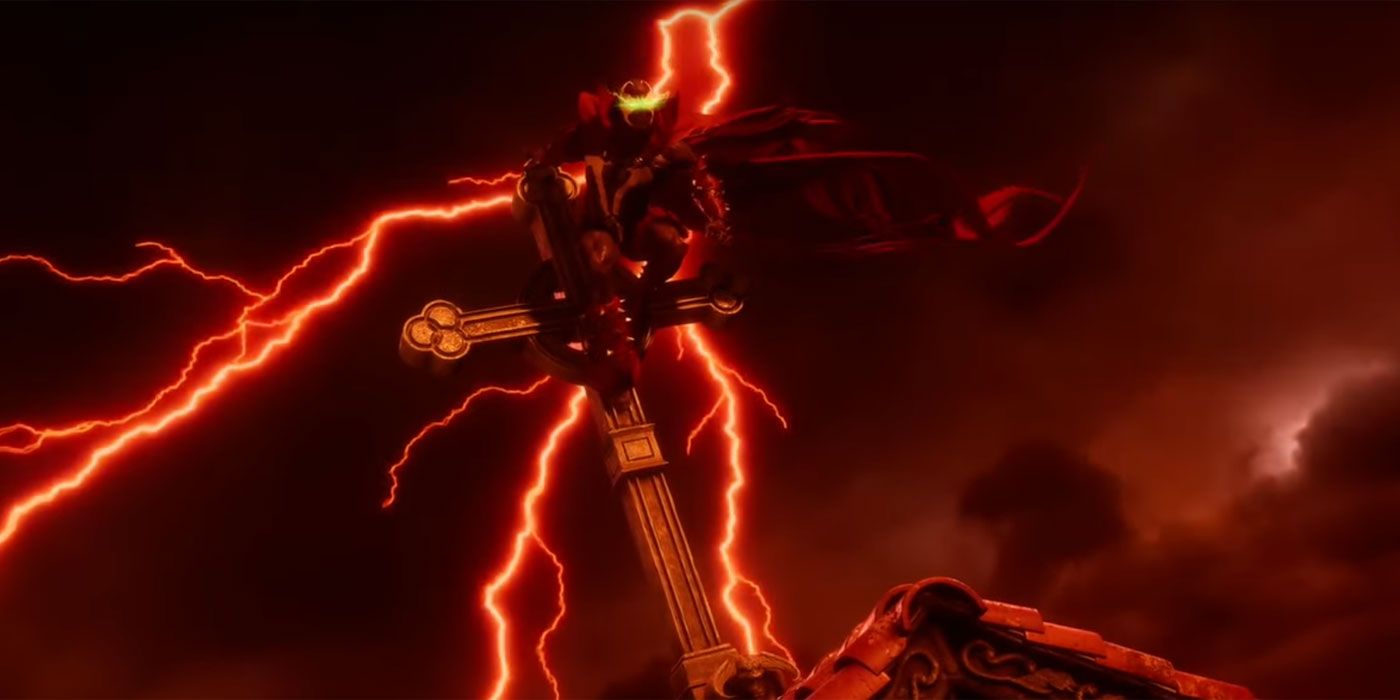
What is it about a McFarlane Toy that gets that special seal of approval from you?
McFarlane: We've had hits and misses so when you get it right you go, "Oh my god, that's it! How come we don't get this all the time?!" Toys are like comic books. It's a pretty inexact science. You wish you could replicate it exactly the same every time. Here's the winning recipe for anybody that wants to make a toy: Do a high-quality product and price it reasonable. And if you want a home run, do the first two things and add a third piece to the puzzle and get a big brand. If you can do high-quality and put it at a really good price and put the word Star Wars on it, you're going to sell it all day long. But I found with Spawn, because it was an unknown brand when we first came into the business, that those first two components mattered.
I'd add a semi-fourth one: Give them a lot of plastic. I've never had a big giant figure that had a lot of plastic not sell because the average consumer notices, when they're walking by the shelves, they go, "Oh my god, that's a Batman, Spider-Man and Star Wars for $9.99 and there's this other thing and I don't know what it is but it's twice as big and it's $9.99!" At some point, people will take twice as much plastic. Never underestimate plastic. Do a $10 toy and sell it for $9; if you do a $30 toy, sell it for $21. Do a $3600 car and sell it for $2400 because people will respond to that, "That car is only $2400? Those other guys are selling it for $30000!" People respond to quality and value. It's a time-tested thing. I haven't invented anything.
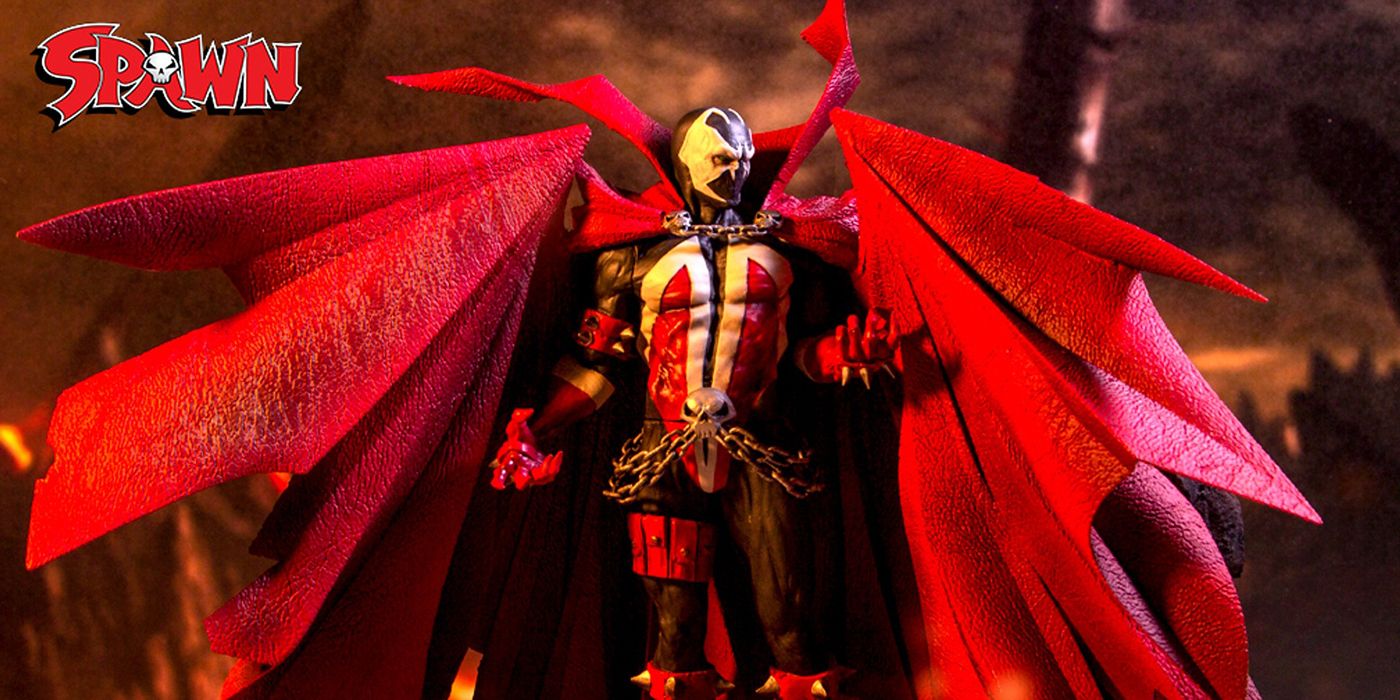
You guys came out the gate swinging in 1992 and when you put out Spawn #300 and #301 and now you're about to do it again with Spawn's Universe. How do you keep that energy going?
McFarlane: It's like I was telling you earlier. I deal with big, billion-dollar companies all day and that light in the corner is that thing that's all yours. You just get to embrace it and do whatever you want. It's like going into Subway and they ask what you want on your sandwich: How do you go home and say that was a horrible sandwich? They asked you! You told them what you wanted! Every sandwich should be awesome because you're making it yourself! My enthusiasm comes from knowing, for the rest of my days, that at any time I want to do anything in a comic book, I have the good fortune of just getting up. I had an idea last night and I can put it into production in the morning if I want. That's not a good day; that's a great day. Every day has the potential to be a great day. That rule applies to me ever since we started in 1992.
The bigger one is that, whatever's happening to me, Image is still way more important. The possibilities exist at Image for all the above: If you have aspirations to follow in the footsteps of Todd McFarlane, he's now an example of somebody involved at Image. If you want to do something closer to the model of Robert Kirkman, then he becomes the example that you follow. If you just want to do cool comic books and something like Saga, then that's your example. If you want to do a book that wins a couple of awards and after years of hard work, it pays off and people start paying attention, that happened this past week with the good creative group that does The Bitter Root that just got picked up by Hollywood. It doesn't have to be one or other. There's just all these examples and dozens more because all of us took that first important step and we at least tried.
And if you at least try -- this is the piece that drives me crazy: When I talk to people and they go, "Well, it was different era when you started Image and it's not the same now," then I go, "Just forget me, Jim Lee and Rob Liefeld. What about Robert Kirkman? He came after us!" They go, "Yeah, but he caught a lucky break and got a record-breaking TV show." Then I go, "Okay, forget him. What about Brian K. Vaughan?" At some point, if you keep talking yourself out of it, you're not built for it. There's one question that will tell me really quickly whether you are built to be an entrepreneur and, if you can, you should try to be an entrepreneur at least once in your life, because you have the personality for it.
Here's the question: Have you ever gone out dancing and been the first one out on a dance floor? And if you answer "yes," then you got the personality, because you set a goal and the goal was to go and dance and you go there and said, "There's music and a floor, we get to dance!" and you met your goal. The other part, whether there were other people dancing, wasn't part of the goal. If you don't have the confidence to get up in front of strangers and dance because you give a shit about what they think of you, you're not built for it. What happens when you're in front of someone you do know, like a business acquaintance, gives you an opinion that might not be conducive to you? You've got be able to weather all that and, if you can't take strangers, it only gets harder from there.
Or you can do what entrepreneurs do and get on the floor and it's even better because it's not crowded. That person usually gets bummed out when there's other people on the floor because then they're more subdued. It's just a personality and the most frustrating piece of it is we all have different personalities. I thought, when I was younger, everyone should be a entrepreneur, everyone should do their own book, but that's not true. There's only a certain segment of us that are willing to do it and that's even better, because you've just eliminated potentially millions of people that might have had a better idea and be way more skilled and smarter by them not making an attempt.
I've got this split personality on stage where I go, as a dad, "I'm a dumb shit and if I can do it, anybody can do it and here's how: Just keep raising your hand and keep doing it until you catch a lucky break and maybe you'll be on stage here." And then I flip to the other split personality as CEO and businessman and go, "I hope you don't do it. I hope you sit there, doubt yourself and talk yourself out of it everyday because then I won't have to compete with you. Make my life easy. Do me a favor and talk yourself out of it, because I would rather be in a race with ten people than a thousand, because I got a way better chance of succeeding." If I was me, I'd listen to the dad personality, but that's just individuals. I got to where I got because I kept trying and every now and then, a blind squirrel finds the nut; I'm living proof of that.
Written by Todd McFarlane and illustrated by McFarlane, Jim Cheung, Stephen Segovia, Brett Booth and Marcio Takara, Spawn's Universe #1 goes on sale June 23 from Image Comics.
0 Comments